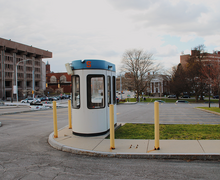Common Council passes resolution asking the state to require some city workers to live in Syracuse
Tony Chao I Art Director
The Syracuse Common Council unanimously passed a resolution on Monday asking the state to amend a law to require that all police, firefighters and sanitation workers live within the city’s limits.
Steve Barnum, the Union President of the American Federation of State, County and Municipal Employees Local 400, called the requirement unfair.
“Right now, my department is required to live within the city. But why make firefighters and police officers live in the limits too? If they’re going to do that, then everyone who works in the city should live in the city, including school teachers.” Barnum said.
The resolution would require the governor and New York state Senate and Assembly to amend the Public Officer’s Law to exempt Syracuse from residency requirements that do not include city workers, according to an Oct. 27 CNY Central article.
Prior to the passage of the resolution, Councilman Bob Dougherty said this initiative would allow more middle-class families to live in the city of Syracuse so they can contribute towards city taxes.
“There are several benefits that come out of workers living in the city. If people are living in the city where they work, they might be more committed to their job,” Dougherty said.
Ninety-two percent of police officers and 67 percent of firefighters currently live outside the city of Syracuse, according to the article.
Dougherty said citizens would feel more comfortable if they knew police officers lived in their city and it would give them a stronger sense of security.
“If you know the cop who lives down the street, it tends to make people think the cops have their interests at heart,” he said.
The city is losing millions of dollars by not having workers live within the city, according to the auditor’s report, Dougherty said. Workers who are not living in the city are taking nearly $60 million in tax revenue with them, according to the report.
If this requirement were to be passed, only new workers would be required to live in the city, Dougherty said. “We don’t want to disrupt people’s lives,” he added.
Dougherty said he also thinks school district employees should be encouraged to live in the city. The district hires about 100 teachers a year, so in 10 years 10,000 middle-class workers would live in the city if they were required to, he said.
Only 5 percent of the Syracuse work force is living within the city limits, Barnum said. He added that putting this regulation into place in order to improve city conditions doesn’t seem reasonable.
Barnum has been in the Union President of the American Federation of State for 19 years and said the Syracuse Common Council tried to put this initiative into effect in the late 1990s, but it did not pick up traction.
“I think people should be able to live wherever they want to live,” said Barnum. “Why change the rules now?”
Dougherty said he thinks the initiative is important for the city in terms of bringing more middle-class workers into it. One of the biggest problems for the city’s school district is that it’s slowly becoming a district of poor people, he said.
“It’s been proven that when you get to a certain poverty level, schools won’t be that great.” Dougherty said. “If we can get more middle-class families to move to the city, we can improve the quality of the school district and prevent people from leaving the city.”
Published on October 29, 2014 at 12:01 am





